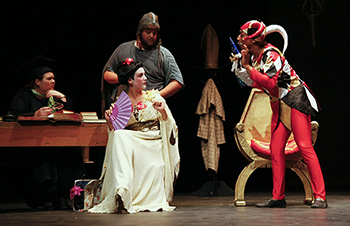Latest News Archive
Please select Category, Year, and then Month to display items
12 January 2024
|
Story Nonsindiswe Qwabe
|
Photo Sonia Small
 Since joining the UFS in 2008, Dr Grey Magaiza has worked extensively on approaches that can foster the socio-economic transformation of societies.
Since joining the UFS in 2008, Dr Grey Magaiza has worked extensively on approaches that can foster the socio-economic transformation of societies.
“The future should be one where communities can decide on their development agenda and futures. That’s the most important for me.” Dr Grey Magaiza, Deputy Director of the Centre for Gender and Africa Studies (CGAS) and Head of the Community Development programme on the Qwaqwa Campus, is passionate about capacitating communities to be agents of change and advancement. His vision for the future emphasises the empowerment of communities to take charge of their development by actively participating in decision making and the implementation of development projects that can improve their lives.
Since joining the UFS in 2008, Dr Magaiza has worked extensively on approaches that can foster the socio-economic transformation of societies. Over the years, he has crafted his research speciality into one that he is most proud of – being an interdisciplinary scientist immersed in the development of communities.
“I’m in a fortunate position of researching what I like. I say ‘fortunate’, because I’ve taken the time to understand what I’m passionate about, which is the overall field of rural livelihoods and livelihood futures – in short, community development. My research starts from an engaged university, understanding the elements that a university must use to enhance transformation and relevance to its immediate community in terms of development.”
One of the ways he has done this is by looking at social entrepreneurship as a development approach for young people in a rural setting. Through workshops with non-profit and civic organisations in Qwaqwa, Dr Magaiza has been helping these organisations to map out their needs and actively meet them through the involvement and support of external role players.
“We understand that communities are part of the national development agenda, but even that national agenda respects community knowledge and intentions and allows communities to shape their identity. A critical enabler of this is community organising. You bring back the capacity in communities to have dialogues on issues affecting them as spaces for engagement, knowledge exchange, and for people to just talk about their way forward.”
By enabling communities to define their development agenda, they can address their specific needs, challenges, and aspirations, he said. “When I look at livelihood futures, it’s quite an exciting aspect of my work – it’s like looking into a fortune tellers’ globe, because you’re not deciding for communities what they should do, but the communities themselves take those decisions.”
Drama students awarded National Arts Council bursaries
2016-05-04
 |
The National Arts Council (NAC) has awarded R100 000 to 10 Drama students at the University of the Free State (UFS). Eight years after its establishment in 2005, the NAC has partnered our university in funding academically-deserving students needing assistance with tuition. To date, our undergraduate students have benefitted from more than R800 000.
Prof Nico Luwes, Head of the Department of Drama and Theatre Arts, who applies to the NAC at the end of each year on behalf of students, welcomes the funds: “Quite a lot of our students would not have been able to complete their studies without assistance from the bursary scheme.”
As a result of this financial injection, South African schools also gain. “Some students then enrol for a higher education diploma, and they then teach Arts and Culture at schools. Hence, there is a whole new generation of Arts and Culture teachers who are now entering the school system,” said Prof Luwes.
Mbuyiselo Nqodi, a second-year BA Drama and Theatre Arts student, would not have been able to enrol at the university in 2015, had it not been for the NAC. “Without the bursary, I would not have been admitted into the university. It helped a lot because R10 000 can go a long way.”
Pursuing its mandate to support and develop South Africa’s arts, culture and heritage sector, the NAC awarded 117 bursaries to arts students and tertiary institutions for the year. A total of R5 million has been allocated for 2016, a 10% increase on the previous financial year.
According to the NAC Chief Executive Officer, Rosemary Mangope, one of the aims of the NAC is to provide support to students who will contribute to the arts and culture industry in a meaningful and sustainable manner.